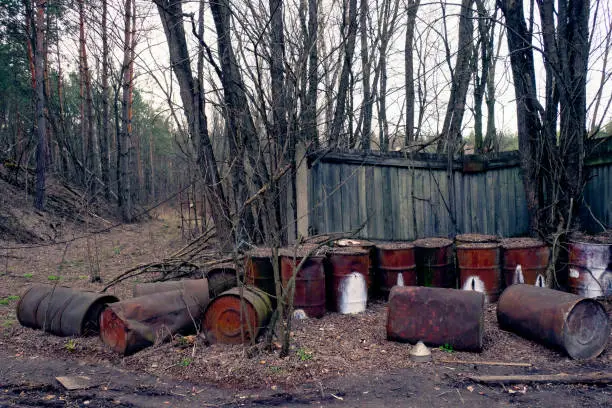Managing probate property in Texas involves a wide range of responsibilities for heirs and estate executors. One of the most significant challenges arises when hazardous waste is on the property. It can include dangerous chemicals, industrial materials, asbestos, lead-based paint, and other pollutants that threaten human health and the environment.
Addressing hazardous waste is crucial to avoid potential legal liability, environmental penalties, and even criminal charges. Executors, heirs, and real estate professionals involved in the sale or transfer of probate property must be aware of their legal obligations and understand how to comply with federal, state, and local regulations. This guide offers a comprehensive look at the legal responsibilities, regulatory requirements, and best practices for managing probate properties with hazardous waste in Texas.
Understanding Hazardous Waste in Probate Property
What Qualifies as Hazardous Waste?
Hazardous waste is defined under federal and state laws as any material that poses a substantial risk to human health or the environment when it’s not handled properly. Probate properties may contain several types of hazardous waste, often without the knowledge of the executor or heirs. Common examples of hazardous waste found in residential and commercial properties include:

- Asbestos: Frequently present in older homes, asbestos is found in insulation, flooring tiles, and roofing materials.
- Lead-Based Paint: Homes built before 1978 may contain lead-based paint, which becomes hazardous when it deteriorates.
- Pesticides: Improperly stored pesticides or old stockpiles may classify as hazardous waste.
- Industrial Chemicals and Solvents: Properties previously used for home-based businesses may contain hazardous industrial materials.
Identifying such on the property is a critical first step in ensuring proper compliance with environmental laws.
Legal Obligations for Executors and Heirs
Duty to Identify and Disclose Hazardous Waste
Executors of an estate, also known as personal representatives, must act in the best interests of the heirs and beneficiaries. Part of this duty includes disclosing known hazards on the property, including the presence of hazardous waste. Executors who fail to identify or disclose hazardous waste risk being held legally responsible.
Key Obligations Include:
- Site Assessment: Executors should conduct a site assessment to identify any hazardous waste on the property. Hiring an environmental assessor can provide a formal report.
- Disclosure Requirements: Texas real estate disclosure laws require sellers to inform buyers about known environmental hazards. Executors must notify buyers, heirs, and regulatory agencies if hazardous waste is discovered.
- Record-Keeping: Executors must maintain records of property inspections, environmental assessments, and any remediation activities undertaken to address hazardous waste.
Failing to follow these obligations can result in lawsuits, regulatory fines, and a reduction in the estate’s assets.
Compliance with Federal and State Regulations
Executors and heirs must comply with laws governing the identification, management, and disposal of hazardous waste. Both federal and state-level regulations outline how hazardous materials should be handled.
Key Regulations to Know:
- Resource Conservation and Recovery Act (RCRA): This federal law governs the management, storage, and disposal of hazardous waste.
- Comprehensive Environmental Response, Compensation, and Liability Act (CERCLA or Superfund): This law addresses the cleanup of contaminated properties, including liability for site contamination.
- Texas Commission on Environmental Quality (TCEQ) Regulations: TCEQ oversees state-specific rules for hazardous waste handling, remediation, and cleanup.
Complying with these regulations is essential to avoid financial penalties, lawsuits, and potential criminal charges.
Steps for Handling Hazardous Waste on Probate Property
Step 1: Conduct a Property Assessment

The first step in handling hazardous waste is to determine if it’s present on the property. Executors can accomplish this by ordering a Phase I Environmental Site Assessment (ESA).
Steps in Property Assessment:
- Preliminary Review: Review property records, previous maintenance logs, and past environmental reports.
- On-Site Inspection: Conduct a physical inspection of the property to check for signs of hazardous waste, like chemical spills, discolored soil, and asbestos-containing materials.
- Phase II ESA: If the Phase I ESA reveals the presence of hazardous waste, a more in-depth investigation (Phase II ESA) with sampling and laboratory testing is required.
Step 2: Notify Regulatory Authorities
After confirming its presence, executors and heirs must notify regulatory authorities, such asthe Texas Commission on Environmental Quality (TCEQ), about the situation.
When to Notify Authorities:
- When the property is listed on the state’s contaminated property registry.
- When hazardous materials on the property exceed the reportable quantities under RCRA or CERCLA.
Failure to notify the authorities can result in regulatory fines and additional cleanup obligations.
Step 3: Develop and Execute a Remediation Plan
If hazardous waste is present, the executor must create a remediation plan to clean up the property. The process of cleaning up hazardous waste can be costly and time-consuming, but it’s a legal requirement.
Steps in the Remediation Process:
- Hire Environmental Consultants: These professionals will evaluate the extent of contamination and create a plan for cleanup.
- Obtain Permits: Certain cleanup activities require permits from TCEQ and other regulatory agencies.
- Site Cleanup: Hazardous materials are removed, treated, or contained in accordance with regulatory guidelines.
- Post-Cleanup Verification: Ensure that the property meets regulatory standards for environmental safety and obtain certification from the authorities.
Executor’s Liability for Hazardous Waste
Personal Liability

Executors can face personal liability if they knowingly fail to disclose or address hazardous waste. Courts may hold them responsible for cleanup costs, regulatory fines, and lawsuits from buyers or heirs.
Estate Liability
In many cases, the estate itself—not the executor—is responsible for cleanup costs. However, cleaning up hazardous waste can significantly reduce the estate’s assets, which directly impacts the inheritance received by heirs.
Third-Party Liability
If the property is sold “as-is” without disclosure of hazardous waste, the buyer can sue the estate for damages. Buyers often conduct their own environmental assessments, but if contamination is discovered later, litigation can ensue.
Selling Probate Property Containing Hazardous Waste
Full Disclosure to Buyers
Executors are legally required to disclose known hazardous waste to potential buyers. This transparency can affect the property’s market value and sale process, but it’s essential to avoid future liability.
Using Environmental Site Assessments (ESAs) as a Sales Tool
Buyers may request a Phase I or Phase II ESA before closing the sale. If hazardous waste is found, buyers might demand that the estate handle remediation before finalizing the sale.
Selling “As-Is” with Buyer’s Consent
In some cases, executors sell the property “as-is” with full disclosure of hazardous waste issues. Buyers assume responsibility for cleanup, often in exchange for a reduced purchase price.
Best Practices for Executors and Heirs
- Hire Environmental Professionals: Employ experienced environmental consultants to conduct assessments and remediation.
- Maintain Detailed Records: Document all property inspections, reports, and cleanup actions to protect against future legal claims.
- Consult Legal Experts: Seek guidance from probate attorneys and environmental law specialists to ensure full compliance with state and federal regulations.
- Communicate with Beneficiaries: Keep heirs informed about the cleanup process, costs, and potential effects on the estate’s value.
Resources for Handling Hazardous Waste in Probate Property
- Texas Commission on Environmental Quality (TCEQ): Offers guidance on waste management and cleanup procedures.
- Environmental Protection Agency (EPA): Provides resources on hazardous waste regulations under RCRA and CERCLA.
- Environmental Consultants: Experts who assess contamination and guide cleanup activities.
- Legal Aid and Probate Attorneys: Assist with navigating probate processes and legal obligations for hazardous waste.
Conclusion
Addressing hazardous waste on probate property in Texas is a challenging but essential responsibility. Executors and heirs must identify, disclose, and manage hazardous materials in compliance with federal and state regulations. By working with environmental professionals, maintaining clear records, and communicating openly with beneficiaries, executors can fulfill their legal obligations and protect the estate from costly liabilities.








